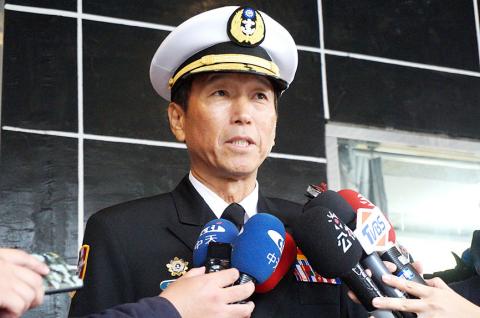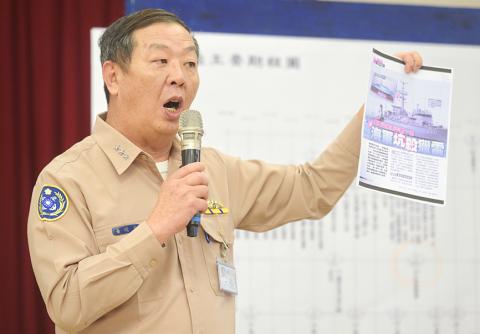The Ministry of National Defense (MND) yesterday censured a number of top navy officers, including Vice Minister of National Defense Admiral Pu Tze-chun (蒲澤春) and Chief of General Staff Admiral Lee Hsi-ming (李喜明), in connection with a minesweeper procurement scandal.
Disciplinary action was doled out for misconduct in contracting Ching Fu Shipbuilding Co (慶富造船) to build the vessels and a report on the minesweeper program presented by defense officials in the legislature last year, the ministry told a news conference.
A total of 24 officers were disciplined, it said.

Photo: Tu Chu-min, Taipei Times
A ministerial task force was called on Nov. 2 after an Executive Yuan investigative report found fault with the military’s handling of the contract with Ching Fu to build six minesweepers, the ministry said.
The probe found flaws in the military’s pre-bidding preparations, the contract, the process for awarding the bid and supervision of the contractor’s compliance with its obligations, it said.
Eighteen admirals and captains were disciplined for their role in the procurement, including Pu, who received a demerit.

Photo: Chang Chia-ming, Taipei Times
Lee and Navy Commander Rear Admiral Huang Shu-kuang (黃曙光), and former deputy minister of national defense Admiral Chen Yung-kang (陳永康) each received two warnings.
Vice Admiral Huang Hsi-ju (黃希儒), procurement division chief of the ministry’s Armaments Bureau, received a demerit.
Nine navy admirals and captains were censured for misinforming lawmakers on the progress that Ching Fu was making on the minesweeper program during a budget report on Nov. 17 last year, the ministry said.
The officers presented a report that was inaccurate, the ministry said, adding that the incident reflected organizational failures on multiple levels of the ministry.
Four of the nine censured for making inaccurate reports to the legislature were also involved in the minesweepers’ procurement.
Armaments Bureau Director-General Vice Admiral Mei Chia-shu (梅家樹) received one demerit and three warnings for his conduct in the procurement process and the budget report.
The officers the ministry censured are currently serving or had served at influential ministerial posts, as well as Navy Command Headquarters and the navy’s Planning Division.
The ministry’s internal investigation is ongoing and it has informed prosecutors of its findings, which might result in criminal proceedings, it said.
President Tsai Ing-wen (蔡英文) vowed to thoroughly investigate the minesweeper scandal, address the government’s shortcomings and forge ahead with the domestic warship program.
“We will find out the truth and uphold the highest standards of accountability. This program that was initiated by previous administration is clearly flawed. The program must be subjected to strict scrutiny, from decisionmaking to bidding, syndicated loans and contract supervision,” she said in a statement.
“Each and every relevant agency must fully cooperate with the investigation... Any individual who is guilty of corruption will receive no leniency, regardless of who they are or what rank they hold,” she said.
The government will keep its focus on problem-solving and correct errors regardless of when they first occurred, she said, adding that the nation needs a more effective procurement system that excludes unsuitable contractors.
Her administration will continue its policy to develop a domestic shipbuilding program, Tsai said.
“It is my hope that this error and failure will be a lesson for our armed forces to find the right path forward,” she said.
“The government’s resolve to be self-sufficient in national defense is unshakable. We will not allow an isolated incident to affect our determination to have navy ships built domestically,” she said.

SECURITY: As China is ‘reshaping’ Hong Kong’s population, Taiwan must raise the eligibility threshold for applications from Hong Kongers, Chiu Chui-cheng said When Hong Kong and Macau citizens apply for residency in Taiwan, it would be under a new category that includes a “national security observation period,” Mainland Affairs Council (MAC) Minister Chiu Chui-cheng (邱垂正) said yesterday. President William Lai (賴清德) on March 13 announced 17 strategies to counter China’s aggression toward Taiwan, including incorporating national security considerations into the review process for residency applications from Hong Kong and Macau citizens. The situation in Hong Kong is constantly changing, Chiu said to media yesterday on the sidelines of the Taipei Technology Run hosted by the Taipei Neihu Technology Park Development Association. With

A US Marine Corps regiment equipped with Naval Strike Missiles (NSM) is set to participate in the upcoming Balikatan 25 exercise in the Luzon Strait, marking the system’s first-ever deployment in the Philippines. US and Philippine officials have separately confirmed that the Navy Marine Expeditionary Ship Interdiction System (NMESIS) — the mobile launch platform for the Naval Strike Missile — would take part in the joint exercise. The missiles are being deployed to “a strategic first island chain chokepoint” in the waters between Taiwan proper and the Philippines, US-based Naval News reported. “The Luzon Strait and Bashi Channel represent a critical access

‘FORM OF PROTEST’: The German Institute Taipei said it was ‘shocked’ to see Nazi symbolism used in connection with political aims as it condemned the incident Sung Chien-liang (宋建樑), who led efforts to recall Democratic Progressive Party (DPP) Legislator Lee Kun-cheng (李坤城), was released on bail of NT$80,000 yesterday amid an outcry over a Nazi armband he wore to questioning the night before. Sung arrived at the New Taipei City District Prosecutors’ Office for questioning in a recall petition forgery case on Tuesday night wearing a red armband bearing a swastika, carrying a copy of Adolf Hitler’s Mein Kampf and giving a Nazi salute. Sung left the building at 1:15am without the armband and apparently covering the book with a coat. This is a serious international scandal and Chinese

COUNTERINTELLIGENCE TRAINING: The ministry said 87.5 percent of the apprehended Chinese agents were reported by service members they tried to lure into becoming spies Taiwanese organized crime, illegal money lenders, temples and civic groups are complicit in Beijing’s infiltration of the armed forces, the Ministry of National Defense (MND) said in a report yesterday. Retired service members who had been turned to Beijing’s cause mainly relied on those channels to infiltrate the Taiwanese military, according to the report to be submitted to lawmakers ahead of tomorrow’s hearing on Chinese espionage in the military. Chinese intelligence typically used blackmail, Internet-based communications, bribery or debts to loan sharks to leverage active service personnel to do its bidding, it said. China’s main goals are to collect intelligence, and develop a